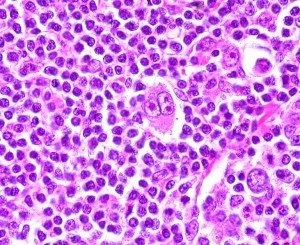August 29th, 2011 by Elaine Schattner, M.D. in News
No Comments »

 Recently, the FDA announced its approval, upon accelerated review, of a new drug, Adcetris (brentuximab) for patients with Hodgkin’s lymphoma that has relapsed after bone marrow transplant and for some patients with T-cell anaplastic large cell lymphoma (ALCL).
Recently, the FDA announced its approval, upon accelerated review, of a new drug, Adcetris (brentuximab) for patients with Hodgkin’s lymphoma that has relapsed after bone marrow transplant and for some patients with T-cell anaplastic large cell lymphoma (ALCL).
This interests me for a lot of reasons, among them that I used to work in the field of lymphoma immunology and spent some time in my life studying molecules like CD30, the protein to which the new antibody binds.
First, a mini-primer on the disease and numbers of patients involved: Read more »
*This blog post was originally published at Medical Lessons*
August 23rd, 2011 by Elaine Schattner, M.D. in Opinion, Research
No Comments »

There’s so much weird and exciting cancer news this week, it’s hard to keep up!
Double-kudos to Andrew Pollack on his front-page and careful coverage in the New York Times of the hyperthermic intraperitoneal chemotherapy (Hipec) technique that’s being used at some name-brand health care facilities to treat colon cancer.
First, he spares no detail in the Times describing the seemingly primitive, crude method:
….For hours on a recent morning at the University of California, San Diego, Dr. Andrew Lowy painstakingly performed the therapy on a patient.
After slicing the man’s belly wide open, Read more »
*This blog post was originally published at Medical Lessons*
August 16th, 2011 by Elaine Schattner, M.D. in News, Opinion
2 Comments »

Last Sunday’s New York Times featured an op-ed by Dr. Ezekiel Emanuel, on the oncology drug shortage. It’s a serious problem that’s had too-little attention in the press:
Of the 34 generic cancer drugs on the market, as of this month, 14 were in short supply. They include drugs that are the mainstay of treatment regimens used to cure leukemia, lymphoma and testicular cancer.
Emanuel considers that these cancer drug shortages have led to what amounts to an accidental rationing of cancer meds. Some desperate and/or influential patients (or doctors or hospitals) get their planned chemo and the rest, well, don’t.
Unfortunately, Read more »
*This blog post was originally published at Medical Lessons*
August 9th, 2011 by Elaine Schattner, M.D. in Opinion, Research
No Comments »

We’ve reached the second half of our discussion on Bending the Cost Curve in Cancer Care. The authors of the NEJM paper, Drs. T. Smith and B. Hillner, go on to consider how doctors’ behavior influences costs in Changing Attitudes and Practice. Today’s point on the list: “Oncologists need to recognize that the costs of care are driven by what we do and what we do not do.”
In other words (theirs): “The first step is a frank acknowledgment that changes are needed.” A bit AA-ish, but fair enough –
The authors talk about needed, frank discussions between doctors and patients. They emphasize that oncologists/docs drive up costs and provide poorer care by failing to talk with patients about the possibility of death, end-of-life care, and transitions in the focus of care from curative intent to palliation.
They review published findings on the topic: Read more »
*This blog post was originally published at Medical Lessons*
July 27th, 2011 by Elaine Schattner, M.D. in News, Opinion
No Comments »

Recently the Times ran a leading story on a new med school admission process, with multiple, mini-interviews, like speed dating. The idea is to assess applicants’ social, communication and ethical thinking (?) skills:
…It is called the multiple mini interview, or M.M.I., and its use is spreading. At least eight medical schools in the United States — including those at Stanford, the University of California, Los Angeles, and the University of Cincinnati — and 13 in Canada are using it.
At Virginia Tech Carilion, 26 candidates showed up on a Saturday in March and stood with their backs to the doors of 26 small rooms. When a bell sounded, the applicants spun around and read a sheet of paper taped to the door that described an ethical conundrum. Two minutes later, the bell sounded again and the applicants charged into the small rooms and found an interviewer waiting. A chorus of cheerful greetings rang out, and the doors shut. The candidates had eight minutes to discuss that room’s situation. Then they moved to the next room, the next surprise conundrum…
This sounds great, at first glance. Read more »
*This blog post was originally published at Medical Lessons*
 Recently, the FDA announced its approval, upon accelerated review, of a new drug, Adcetris (brentuximab) for patients with Hodgkin’s lymphoma that has relapsed after bone marrow transplant and for some patients with T-cell anaplastic large cell lymphoma (ALCL).
Recently, the FDA announced its approval, upon accelerated review, of a new drug, Adcetris (brentuximab) for patients with Hodgkin’s lymphoma that has relapsed after bone marrow transplant and for some patients with T-cell anaplastic large cell lymphoma (ALCL).












